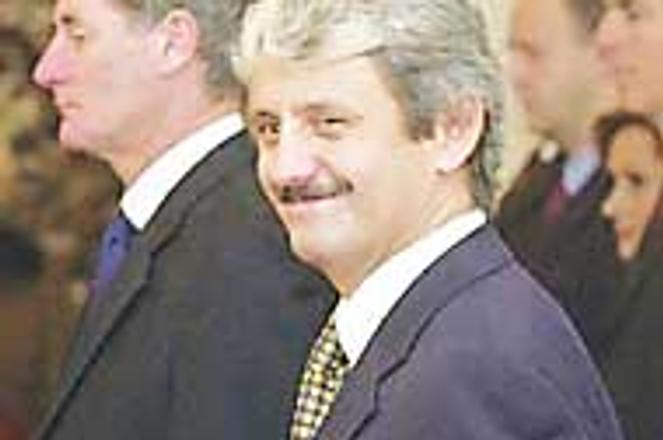CABINET officials did not hide their optimism following an October 16 swearing-in ceremony.photo: TASR
ONLY HOURS after being sworn in by President Rudolf Schuster the members of Slovakia's new cabinet got down to business, meeting to discuss the 2003 state budget draft and the spending cuts the government is determined to introduce.
The topic of the October 16 cabinet meeting was in keeping with the reform promises of the center-right Mikuláš Dzurinda government. Besides reducing state involvement in the economy, the four coalition parties foresee deep changes to Slovakia's pension, social benefits, education, agriculture, justice and health care sectors.
The speed with which the new ministers moved reflected the sense of urgency that has gripped the Western-oriented parties since their narrow majority victory in September elections. With both Nato and European Union enlargement summits scheduled for the next two months, government politicians have said they want to have as much work under their belts as possible before entry invitations are written out in Brussels.
Schuster, on being told by Foreign Minister Eduard Kukan that the cabinet would work "honorably and responsibly", replied that the custom of giving new governments 100 days of grace before taking them to task "in your case will not be required".
Presidential spokesman Ján Fule explained the president had been referring to the fact that three of the four coalition parties will be continuing in office from the 1998-2002 Mikuláš Dzurinda administration, "and that the cabinet is competent and nothing will stand in the way of its getting down to work."
While there may indeed be no further barriers to reform, compared to the many that existed within the previous wide-spectrum administration, some officials warned against unrealistic expectations.
"Ordinary people are looking forward [to the cabinet's work], and public expectations are perhaps even higher than they were four years ago [when a Dzurinda coalition defeated authoritarian Prime Minister Vladimír Mečiar - ed. note]," said Béla Bugár, head of the ethnic Hungarian SMK party.
Sociologist Pavel Haulík, noting the breadth of the incoming government's reform promises, said he feared the cabinet was biting off more than it would have time to chew.
"Four years is too short a period of time for them to achieve everything. There's just too much," he said.
The misgivings, however, failed to dampen the spirits of many new ministers.
Health Minister Rudolf Zajac, long a critic of government health policy, said he was itching to launch an audit of the Health Ministry before reducing its involvement in the sector. "I don't even know what this department does," he said.
Labour Minister Ľudovít Kaník said he planned to rewrite the Labour Code and reform the pension system; Justice Minister Daniel Lipšic, 29, spoke of plans to create a special court for trying major corruption and Mafia cases, of computerized case-assignment systems, of special prosecutors and crown witnesses.
"Better times are at hand," remarked Schuster, noting with approval that the new parliament, which sat for the first time October 15, had seen both opposition and government candidates for legislative office drawing support from both sides of the house.



